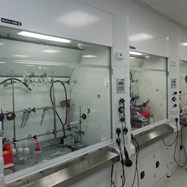Blog: A positive deal for science on the horizon?
04 May 2018
Russell Group's Head of Policy, Jessica Cole, reflects on some of the latest developments around Brexit, science and innovation, the EU budget proposals and what next for UK-EU research cooperation
The Science and Technology (S&T) Committee has today published the Government’s response to its report on ‘Brexit, science and innovation’. It includes some helpful indications about the Government’s intentions for the future UK-EU relationship on science and gives us reason to hope a positive deal could be on the horizon (excuse the pun...).
Shaping the debate
Firstly, the response notes that:
"The UK highly values its participation in EU framework programmes and intends to engage fully and constructively in the design of FP9."
We have welcomed the publication of the Government’s position paper on the ninth EU framework programme for research and innovation, FP9 (now being dubbed the ‘Horizon Europe’ programme). The paper echoes a number of the key priorities identified by the Russell Group, in particular emphasising the importance of excellent science. It is more essential than ever that the UK takes the opportunity to help to shape this programme. The UK is a global leader in science and innovation and we are often reminded that our EU partners value the expertise and experience that UK universities, academics and funders can bring to discussions.
The EU institutions are expected to work to a tight timetable for agreeing the legislative texts underpinning Horizon Europe, which are due to be published on 7 June 2018. The European Parliament elections are scheduled for May 2019 and they want to make as much progress as possible before then. This should work in the UK’s favour as we will lose our MEPs and our seat at the European Council table after 29 March 2019, so we need to make the most of these channels whilst we can.
UK involvement in future EU programmes
The Government’s response to the S&T committee report goes on to state that:
“we would like to ensure Framework Programme 9 remains open to our association. We recognise that such an association would necessarily involve an appropriate financial contribution in line with other associates and would like to discuss the details.”
In her Mansion House speech in March, the Prime Minister explained that “the UK is committed to establishing a far-reaching science and innovation pact with the EU, facilitating the exchange of ideas and researchers. This would enable the UK to participate in key programmes alongside our EU partners.” However, the report today is possibly the first concrete reference to FP9 and to the UK’s desire to discuss the details of association. (Currently, associated countries pay a contribution into the Horizon 2020 pot based on their GDP and can access funding across all parts of the programme under the same conditions as member states).
The Government identifies three priorities for the next programme:
“The first being that the programme remains focussed on excellence, EU- added value and openness to the world (as outlined in our position paper).”
Each of these issues have also been identified as priorities for the European Commission, so the UK seems to be well aligned with the EU on this.
“Secondly, we want to ensure appropriate financial contributions for associated countries.”
It is helpful that the Government is openly recognising that there will be a cost to UK participation in EU research after Brexit. Since other non-EU countries already pay to take part in EU research programmes, there are some precedents for how a financial contribution could be calculated and it makes sense to look at these as a starting point. We would want to ensure the UK is treated fairly alongside other associated countries.
Nevertheless, it is difficult to ignore the fact that the UK is in a different position, not least because of our size: we currently make up around 12% of the EU’s budget contributions, whilst less than 5% of the Horizon 2020 budget comes from all associated countries combined. EU Research Commissioner Carlos Moedas has recognised this, reportedly saying in December that “We have to find a different solution for an ally, Great Britain, that is very big. So far we had association with countries that were smaller than most of our countries.” But there seems to be goodwill to explore the options, as he went on to say he was “absolutely convinced that at the end of the journey, after all this effort, we’ll find a solution”.
There are also questions about what say the UK might have over the direction of the programme if we are to make a serious financial contribution, whilst recognising that our exit from the EU inevitably changes our relationship. This is picked up in the Government’s third priority:
“Finally, confirmation that the programme allows associated countries a suitable degree of influence, in recognition of the benefits they bring to the programme, and in line with their financial contributions.”
Involving the UK in discussions about how the programme will operate and which priorities to focus on will help strengthen the programme for everyone’s benefit, as well as ensuring accountability for UK funds.
Boosting the budget for R&D
The European Commission published its proposals for the EU’s budget for the period 2021 to 2027 this week. It includes plans for a 50% increase in research and innovation spending, with a suggested €100 billion for Horizon Europe. In the context of an overall reduced EU budget without the UK’s contributions, the Commission’s ambitions to expand the research and innovation programme are welcome. Politico ranks Commissioner Carlos Moedas as the most powerful player in the budget negotiations that will ensue, highlighting the importance of this programme and his role.
Other science and research organisations have called for a budget closer to €160 billion and Commission President Juncker described this level of investment as his “dream”. Ensuring the programme is truly “open to the world” as Moedas envisages, allowing countries outside the EU to be more involved in the programme in return for contributions to the pot, is one way to help bring the overall budget up. At the same time, this will also facilitate collaboration with a wider pool of top international researchers and expertise.
What next?
These are all positive signs, but there is still a long way to go. One of the top priorities now is for the UK and the EU to agree a high-level science and innovation pact. The Government’s response to the Science and Technology Committee report is clear on this point:
“We would like to discuss possible options as soon as possible.”
Getting an agreement on this early will help set a constructive tone for the more detailed discussions to come on potential UK association to Horizon Europe. It will also send a clear signal to academics, universities and businesses in the UK and across Europe about the positive intentions of governments on both sides to ensure our long history of collaboration can continue.
-
Jessica Cole
jessica.cole@russellgroup.ac.uk
020 3816 1305
 X
X


